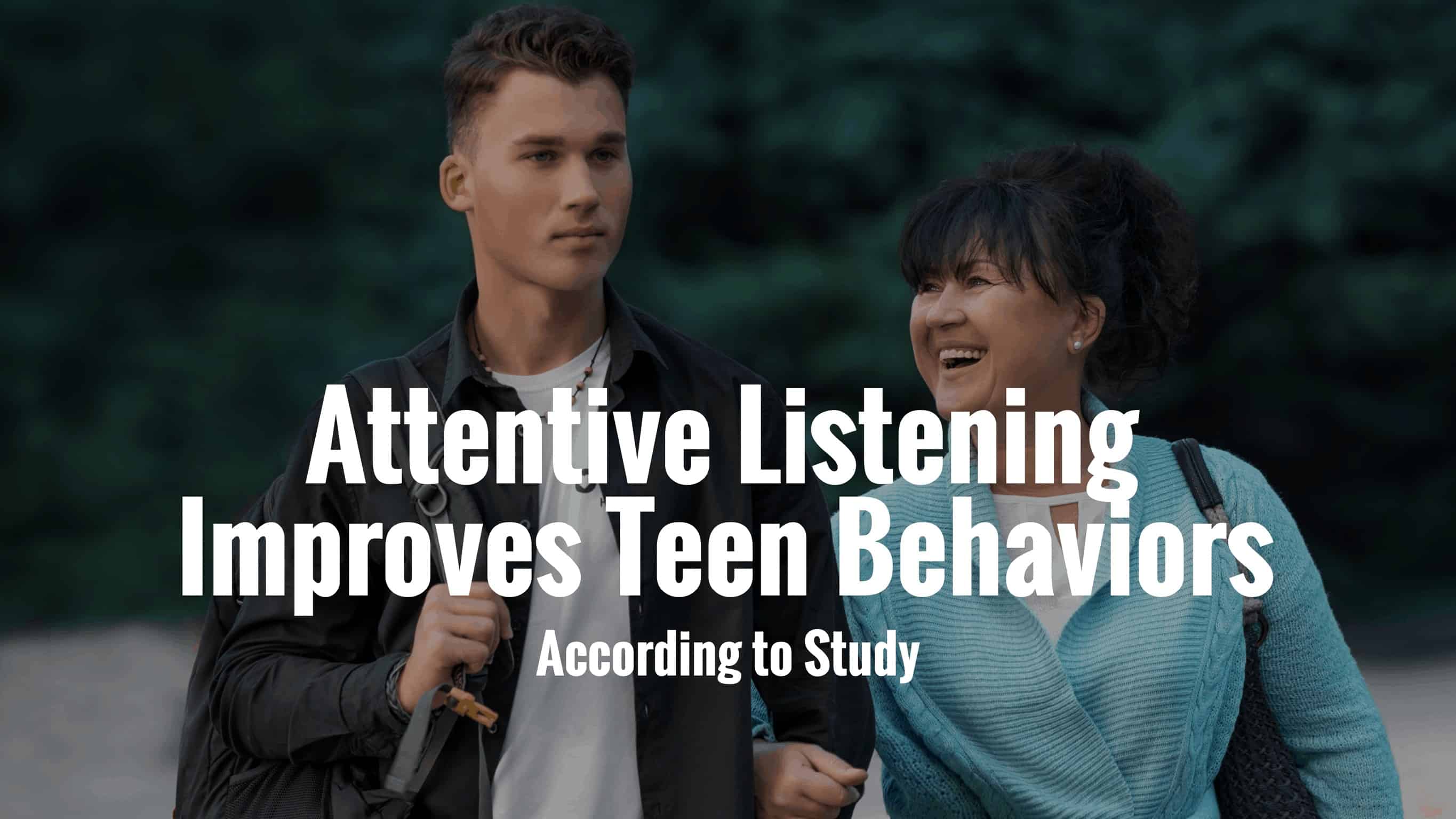In today’s fast-paced world, how often do we practice attentive listening? Usually, the words of our loved ones, friends, and colleagues go in one ear and out the other. Most of us don’t do this intentionally; we may have a million different thoughts at that moment, making it hard to pay attention.
However, it’s hurtful for the speaker when it seems like the other person isn’t engaged in the conversation. Especially for children and teenagers, it’s vital for them to feel heard by their parents and peers. A recent study found that engaged techniques like attentive listening help teenagers open up more. Eye contact, nodding and using words to praise openness also help improve teen behaviors.
If your teenager feels comfortable sharing their lives with you, it’s easier for them to admit poor behavior. It also makes them more likely to open up if they feel hurt or betrayed by someone in their life. If they’re not coming to you with problems, it may mean they’re feeling neglected or ignored.
About the Study
The study by University of Reading and Haifa researchers involved 1,001 teenagers aged 13 to 16. The team asked them to observe a staged conversation between a parent and teenager regarding a difficult situation. The discussion was repeated in various scenarios, where the parent adopted different body language and listening behaviors.
The participants who watched the versions where the parent practiced attentive listening shared positive feedback. They said that they would’ve had more confidence as a teenager and would have felt more comfortable opening up in the future.
The study is the first of its kind to analyze attentive listening in isolation from other parenting techniques. The research shows that teens feel more confident and connected with parents who make more effort to communicate. The study was published in the Journal of Experimental Child Psychology on June 2, 2021.
 How attentive listening helps improve teen behaviors and confidence
How attentive listening helps improve teen behaviors and confidence
Many times, teenagers act out because they’re hurting inside. Whether they’re having problems at home or in school, they need to have a support system. If they don’t have an outlet for their feelings, they may release them in unhealthy ways.
Studies have shown that teens who engage in risky behaviors like smoking and drinking usually have problems at home. Similar findings have been discovered with teens who act out violently or who have mental disorders. Without a stable support system, the teen may feel they don’t have a solid foundation. This can lead to angry outbursts and other maladaptive behaviors in some cases.
Dr. Netta Weinstein, associate professor in clinical and social psychology at the University of Reading, who co-led the study, said:
“We all know that listening to someone talk about their problems is an effective way of reassuring them and establishing a connection. However, until now there has been little thought given to the quality of that listening, and the difference that makes. This study shows that in parent-teenager relationships, quietly listening to a teenager while showing them they are valued and appreciated for their honesty has a powerful effect on their willingness to open up.”
The study included roughly equal numbers of male and female teens, with three identifying as another gender. The team found that almost all participants regarded attentive listening as necessary.
In the first video conversation, a teenage boy admitted to his mother that he’d tried vaping and felt ashamed. While in the second scenario, the boy reveals to his mom that his peers rejected him after he’d refused to vape. In this situation, he told her he felt hurt by their reaction.
Both scenarios included two versions of parental behaviors. In the first, the parent practiced attentive listening. In another, they appeared more distracted and had less eye contact with the teenager.
Dr. Weinstein said: “With such a large group of participants, it is reassuring to see that active listening was universally beneficial across these years of adolescence.
“The study has some important implications for teenage wellbeing as well. The participants said that the good listening model observed in the videos would lead to better wellbeing. Although we don’t know how often the expectations meet reality, it’s clear that active listening is more likely to lead to a good outcome for teenagers than the more passive style we tested it against.”
Other benefits of attentive listening for teens
Children and teens model their parents’ behavior, so it’s essential to keep this in mind. Children especially pick up everything from their environment like a sponge. So, if you’re constantly fighting with your spouse or not showing them much attention, the kids will likely mimic this behavior. On the other hand, if you’re expressing love and genuine concern for your spouse, the children will receive positive feedback from their environment.
As they grow up and become teenagers, a positive relationship with you does wonders for their mental health. Teens experience many life changes as they mature, and they will probably have friend and relationship drama at some point. During this turbulent time in their life, they need to have someone on their side who they can trust. If you practice attentive listening and non-judgment with them, they’ll feel more comfortable opening up to you.
As a result, they’ll feel more confident in their skin and better handle problems that come their way. Plus, your teen will experience the benefits of attentive listening firsthand. This advantage means they’ll likely carry over the behaviors into their personal life, which will benefit their peers as well.
 Final thoughts on the study showing how attentive listening improves teen behaviors
Final thoughts on the study showing how attentive listening improves teen behaviors
It’s not always easy to give someone your full attention. Most of us have a zillion things going on and have a hard time focusing on a conversation. However, if you have children, they benefit significantly from active listening without distractions. The study above shows that teens especially show improvements when their parents make more effort to engage.
If you have a teen who acts out or hides in their room for hours, give active listening a try. It may bring out a whole new side to your teenager that you’ve never seen before.


















